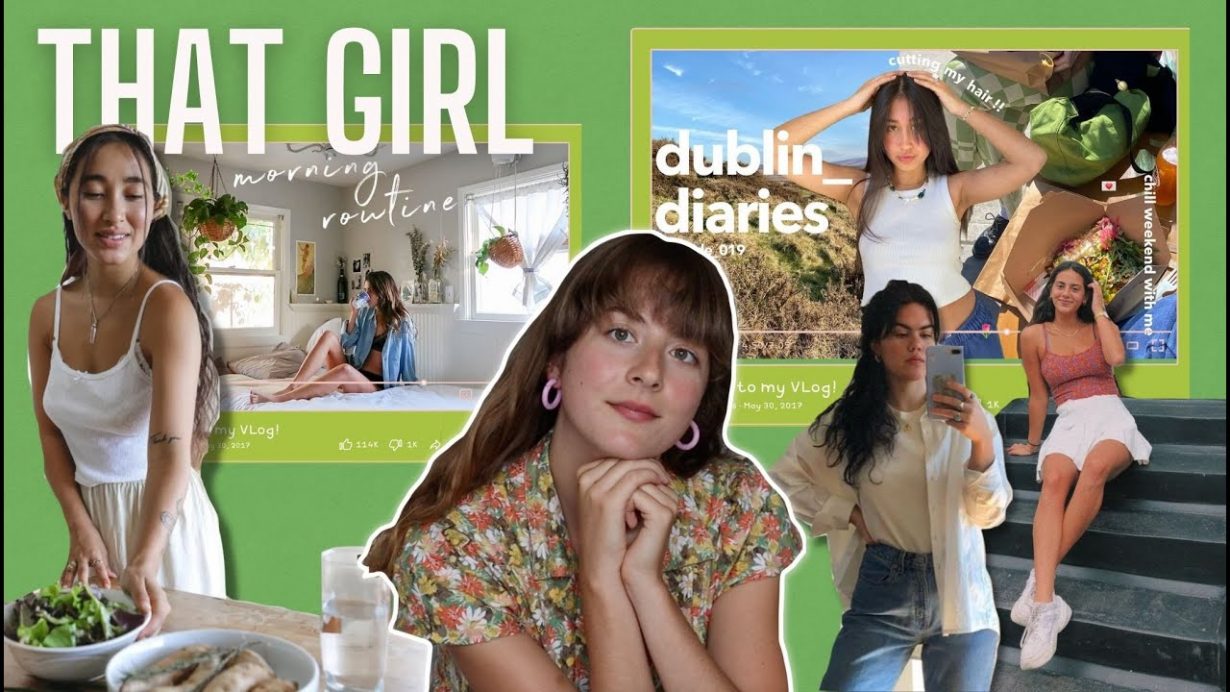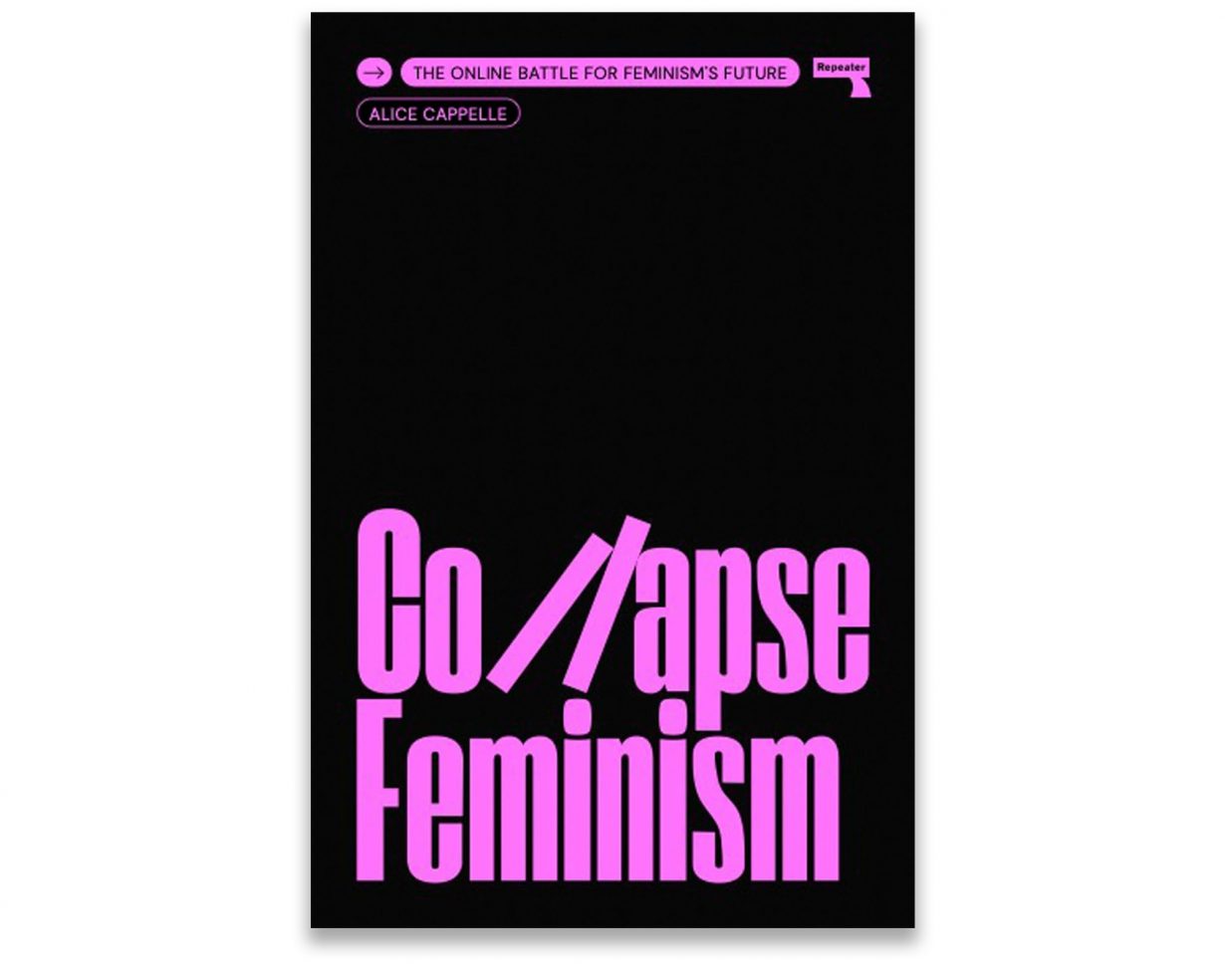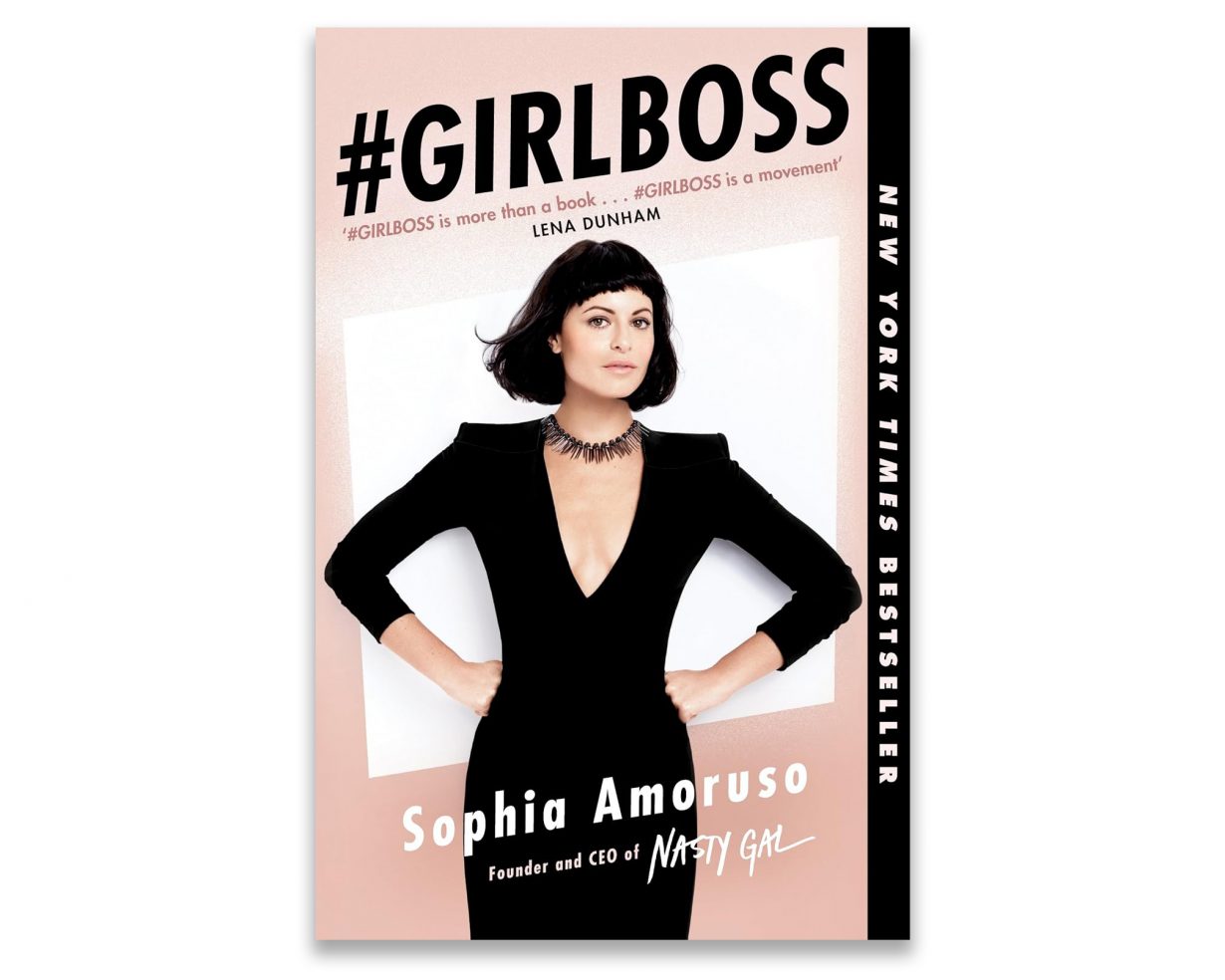Alice Cappelle’s Collapse Feminism: The Online Battle for Feminism’s Future looks at how internet trends and algorithms have ushered in a backlash against women’s rights
Are we currently in a ‘wave’ of feminism? That is, an era in which the formation and general demands of the women’s rights movement are distinct from other eras and heard loudly throughout the various halls of culture? Ask Google, of course, and you’ll be informed that we are still firmly in feminism’s extremely-online fourth wave, which began around 2010, and might therefore be looking a little tired. The odd Substack or Medium post suggests we have entered a fifth, which forefronts action offline and the needs of all marginalised people (sounds great, in theory). In her recent book Collapse Feminism: The Online Battle for Feminism’s Future, YouTuber and author Alice Cappelle suggests that we may not be in a wave at all. Using social media as a kind of looking glass, Cappelle sets out to explore whether feminism – to borrow internet vernacular – is in its flop era, or whether it is – as the ‘collapse’ of the book’s title might infer – doomed.
Cappelle begins by setting the scene. In France, where she lives, despite the recent and symbolic move to make abortion a constitutional right, reports claim that sexism is ‘stagnating’ or else ‘advancing’. Meanwhile, Amnesty International recently warned of a dramatic deterioration of women’s rights worldwide. Cappelle also references a 2022 New York Times article by Michelle Goldberg, ‘The Future Isn’t Female Anymore’, which observed the absence of a significant political groundswell in the wake of the decision to overturn Roe v. Wade. In the years since #MeToo exploded, Goldberg noted, women have been distancing themselves from the term ‘feminism’, some even describing it as ‘cringe’. Indeed, returning to the ever-veritable Google, searches for the word last peaked in 2014, when Beyoncé appeared with the word ‘feminist’ emblazoned behind her at the VMAs, marking a crux for pop-cultural visibility, and then again, in early 2017, concurrent with the global Women’s March. When one considers that, other than the US rescinding the right to abortion access, Barbie (2023) may be the most significant cultural ‘moment’ in Western feminism for half a decade, it seems plausible and justifiable that, as Rosanna McLaughlin recently observed in these pages, ‘fatigue has set in’.

Early on in the writing process, Cappelle discovered that ‘when people enthusiastically asked me what I was writing about, I struggled to say the word “feminism” because of its negative connotations’. Readers may relate. Personally, I find myself less likely to self-identify as a ‘feminist’ than a decade ago due to the association of the term with trans-exclusionary radical feminists, whose sorority ends at trans women and who appear to be fixed on firmly biological definitions of what makes a woman. Similarly, for many, feminism has become synonymous with white feminism: white women wanting ‘parity with white men at any cost, including by avidly taking on the domination of Black and Brown people’, as the writer Rafia Zakaria offers in Against White Feminism (2021). Take the recent online outcry over Barbie star Margot Robbie’s Oscars nomination snub. Many decried the reaction as the apotheosis of white feminism, given that women in Gaza were (and still are) simultaneously being starved and denied natal care, a fact that received little or no airtime from those upset by Robbie’s omission from the nomination list.

While many of these issues play out over the internet, Cappelle chooses to focus her attention more specifically on how conservative and antifeminist ideology has been spreading online, partly as a backlash against #MeToo. Wading through TikTok, YouTube and the alt-right internet, Cappelle emerges with a report that seems to suggest that feminism is not only experiencing a branding problem – underlined by a critical failure to include those who feel the burden of social inequality the most – but a full-blown identity crisis. Who is she? we might ask.
Feminism has always been an umbrella term for splintering groups with different routes to varying goals; radical, liberal, Marxist, etc. Now, as feminism increasingly intersects with internet culture, Cappelle argues, these groups have been replaced with and even obfuscated by new online subcultures, identity categories and terminology. Like ‘microtrends’ – hyper-accelerated fashion trends that are born and die mostly on TikTok – these ‘movements’ are aesthetic and often shortlived. Yet, as Cappelle evidences, they tell us something about the times we are living in and its attitude to women’s rights.

Take the ‘girlboss’, the self-made hustler figure who dominated the 2010s. Eponymised by entrepreneur Sophia Amoruso’s 2014 book, the ‘girlboss’ succeeded on her own distinctly female terms (much like the SheEO), somehow standing for meritocracy and sisterhood at the same time. When this observation was lobbied against her, the #girlboss proved evermore business savvy; she evolved by adopting a hue of ‘pastel progressiveness’, a surface-level acknowledgment of her privilege. However, when the ‘gaslight, gatekeep, girlboss’ meme surfaced in 2021 (a play on ‘live, laugh, love’), cynicism around girlboss empowerment fully exposed itself. She has since died at the hands of a younger generation who have realised that the fight for women’s right to work or have a seat at the (board) table might not have delivered the liberation we hoped for. Enter phrases like ‘I don’t dream of labour’, ‘quiet quitting’ or ‘slow living’. Enter also new female paradigms like ‘that girl’ and the ‘trad wife’.
As an Instagram and TikTok phenomenon, ‘that girl’ refers to the 5am-rising and green-juice slurping optimised woman who broadcasts her life online. She is healthy, attractive and financially solvent. In one of Collapse Feminism’s most amusing passages, Cappelle places Patrick Bateman’s morning routine alongside that of your typical ‘that girl’. Her routine, like her image, is meticulous, idealised and largely unattainable. It is also strangely homogenised, which is – in my own experience – what makes her so compelling. She is the similarly Stepford-esque hot younger sister of the ‘trad wife’, the growing trend of women who adopt the aesthetics of 1950s housewifery and espouse a return to good old-fashioned family values from their social media accounts. Defended as ‘her choice’, the trad wife’s stay-at-home lifestyle is made possible by financial security, perhaps a dual salary or an income stream generated by content creation. Like that girl’s lifestyle, it is far from accessible to most people amid a recession. Cappelle notes: ‘Under the TikTok videos of trad wives women comment how they wished they had time to relax, prepare their own meals and be creative.’ Other commenters express frustration that a woman’s place still seems limited to either work or home. Both reactions seem to share the same sentiment: disappointment with our lot.

Neither of these figures is radical, says Cappelle; the former is the neoliberal girlboss in a new disguise, the latter is deeply gender traditionalist. However, neoconservativism is not only surfacing among ‘tradfluencers’, but among young men. Cappelle points to the ‘manosphere’, which at best advocates that seducing women is a formula that can be cracked and at worst suggests feminism is responsible for the fall of Western civilisation. Cappelle analyses how misogynistic communities have appropriated the work of thinkers we might have considered vaguely progressive. Alain de Botton’s conceptualisation of ‘the nice guy’ has been weaponised to make the point that, well, nice guys finish last. Richard Reeves’s book Of Boys and Men (2022) argues that boys and men are being left behind at school and at work while women are excelling. This has been adopted to demonstrate a crisis of masculinity, despite the fact Reeves is careful not to claim women and girls have surpassed men in general societal standing. ‘In the “post-feminist” world we live in, lonely men have become the marginalised,’ surveys Cappelle. Interestingly, it is not only men sharing these views; rightwing commentators like Pearl Davis, Candace Owens and Brett Cooper advocate the message that feminism has gone too far.
‘It’s easy to criticise the extreme, but how do we get there?’ Cappelle asks in Collapse Feminism, suggesting the Trojan Horse is often self-help-style or wellness-related content. On TikTok, self-help-style videos on how to spot ‘red flags’ in men sit alongside those performatively expressing heteropessimism (the belief that straight relationships and sex will disappoint). Some videos posit voluntary celibacy (#volcel) or marriage as a means to ‘tame men’ as solutions. Young men, meanwhile, might engage with content on fitness, dieting or dating, many of which advocate for men to reclaim their masculinity by any means necessary – and so on down the content rabbit hole to antiwomen, anti-immigration and anti-LGBTQ+ rhetoric. While appearing as two different echo chambers, these content pipelines are interrelated. In the wake of #MeToo, women are not only alert to sexual harassment but to ‘toxic masculinity’ more broadly; growing numbers are rejecting casual sex. Some young men, meanwhile, feel persecuted, rejected or deprived.

Since Cappelle’s book was published, research has shored up this point. A recent study from King’s College London found that 68 percent of women aged sixteen to twenty-nine are likely to say it is harder to be a woman than a man, compared with 35 percent of men of the same age, while 12 percent of Gen Z men think the term feminism ‘has done more harm than good’. These findings link to a broader political splintering: in the US, women aged eighteen to thirty are now 30 percentage points more liberal than male contemporaries. This gap took six years to open up, a period – not coincidentally – taking us back to the explosion of #MeToo. According to experts behind the study, algorithms are both a cause and effect of these attitudes. They confirm our theories of affliction, give us gurus to guide us and also assuage our loneliness.
Broad in scope – quoting David Graeber or Slavoj Žižek on one page, say, and the lyrics of WAP on the next – Collapse Feminism reads a bit like a high-speed leftist romp through all of contemporary culture. At moments it feels click-baity; Cappelle’s book often presents complex issues in fairly introductory terms, appropriating the trending language of the internet for relevance and using pop culture references to segue into heavier ideological discussions. In this sense, the book mirrors many of our experiences online: users come across content that may seem light or even innocuous, only to find themselves inadvertently consuming politically extreme content moments later. The speed of format evolution, language, labels and trends can leave us chasing our tail in terms of literacy.
In this whirling landscape, those who shout the loudest, in the most explicit terms – like the defenders of trans-exclusionary radical feminism, advocates of ‘family values’ or alt-right pundits – are claiming the most visibility, followers and engagement. Cappelle has explained that her approach, both in her book and on her YouTube channel, is deliberate. Collapse Feminism observes that a conservative turn might be occurring because ‘the left is clearly losing at the culture war game that the right nurtures online’. She suggests we might play the right at its own game and reengage readers with critical approaches and progressive values. Social media platforms are exposing and interpolating us into snap gender ideology that pits men and women against one another – ‘we must offer something different’, Cappelle says. Making feminist theory more accessible might be one route.

Ending optimistically, then, the author does not believe feminism is entirely doomed. But if feminism is in a flop era – rejected as ‘cringe’, irrelevant or problematic by those who may have once worn the badge proudly – we are tasked with how to revive or reorient it. There has been a heavy focus on consent during and after #MeToo, which – while important – can sometimes lead us back to the notion that women are ‘in charge’ of their safety and pleasure, while placing the onus on individual men to resolve a more structural problem around gendered attitudes. ‘Labelling men as toxic or healthy’ might not be productive for the same reasons, Cappelle argues; maybe we need to look beyond consent to ensure we understand one another’s positions, and forge better alliances. She quotes bell hooks’s All About Love: New Visions – published in 2000 but recently viral among young readers looking for alternatives to the neoliberal iterations of femininity outlined above. ‘The rugged individual that can rely on no one else is a figure that can only exist in a culture of domination,’ hooks writes.
We might also remind ourselves of hooks’s definition of feminism as something that one advocates, rather than is, Cappelle concludes. But what to advocate for? From looking beyond the workplace or the home as two binary spheres of female fulfilment to rejecting the family as the primary locus of care, Cappelle ultimately offers several ideas. The starting place, however, might be more straightforward: start calling feminism ‘feminism’ again?
Amelia Abraham is a writer living in London and the author of Queer Intentions: A (Personal) Journey Through LGBTQ+ Culture (2019)
